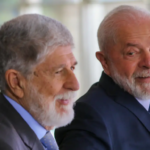
European allies reinforce that any decision about the country’s future must come from Kiev, rejecting external pressures that reduce its autonomy and security
Diplomacy, by definition, should seek a balance that preserves the dignity and sovereignty of the parties involved. However, discussions on the peace plan for Ukraine, led by German Chancellor Friedrich Merz and US President Donald Trump, represent the exact opposite: a cynical realpolitik agenda aimed at forcing Kiev into submission to Russia’s imperialist demands. The phone conversation between the leaders, which takes place under intense pressure from Washington for Ukraine to accept a surrender agreement, reveals how geopolitical interests and financial profit are being placed above the fundamental principle of national self-determination.
Read also: German government says Trump and Merz handled actions against Ukraine
The fact that Merz — Europe’s main leader at the moment — discusses and carries out a plan that ostensibly favors the Kremlin, even before meeting with his European partners at the G20 summit, signals a dangerous convergence of the transatlantic right to the detriment of Ukrainian justice and sovereignty.
The 28-point plan: the price of sovereignty on the Wall Street counter
Central to the discussions is a 28-point plan, put together by envoys from Trump and Russian President Vladimir Putin, that essentially hands over the keys to Ukraine’s future security in exchange for an immediate ceasefire. The proposal, obtained by Bloomberg News, is a series of drastic concessions that reward military aggression.
Among the most critical terms, Ukraine would be coerced into ceding large portions of territory currently occupied, with the regions of Crimea, Luhansk and Donetsk being “recognized as de facto Russian, including by the United States”. This is not peace, but the legitimization of territorial annexation through force.
The plan advances by undermining Kiev’s future defense capabilities. The demand that Ukraine renounce NATO membership and enshrine this promise in the Constitution, together with limiting the size of its Armed Forces, represents an unacceptable restriction on national sovereignty. It is a requirement of imposed neutrality, which leaves the country vulnerable to future aggression.
In return, Russia, the aggressor country, would be awarded the gradual suspension of sanctions and, in a highly symbolic way, would be reintegrated into the G8, ending its international isolation. The balance of this proposal is overwhelmingly tilted towards Moscow, compromising the security and political future of a country that is fighting for its existence.
The geopolitics of profit: how Washington benefits from the Russian freeze
The most outrageous aspect of this “peace deal” is its financial architecture, which turns the reconstruction of Ukraine into a profitable operation for the United States. The plan calls for about $100 billion in frozen Russian assets to go toward U.S.-led reconstruction efforts. However, the American government would receive 50% of the profit of these assets. The unused remainder would be allocated to a Russian-American investment fund.
This debunks Washington’s so-called morality. Instead of acting as an unconditional ally in defense of democracy, the Trump government is structuring compensation for Russian aggression as a business counter, where the American state becomes a financial extractivist, profiting from the devastation of a conflict that should have its burden paid in full by the aggressor. This clause demonstrates that Washington’s primary interest is financial gain, not justice for the Ukrainian people.
The rejection of the allies and the principle of Kiev self-determination
Despite coercive pressure exerted by Washington — which may include the threat of withholding weapons supplies and intelligence information to force Zelenskiy to accept terms — the response from Ukraine’s staunchest allies has been coherent and morally correct.
British Prime Minister Keir Starmer and Europe’s top diplomat Kaja Kallas echoed the same democratic principle: “Ukraine’s future must be determined by Ukraine and we must never lose sight of this principle which underpins the just and lasting peace we all desire.”
This is the red line that cannot be crossed. Trump and Putin’s peace plan is essentially a push by two nuclear powers to impose limits on the sovereignty of a smaller country. It is a dangerous precedent for international law, where force is rewarded and self-determination is negotiated at a table dominated by hegemonic interests.
By demanding that Ukraine compromise its sovereignty and future security, the plan is a capitulation. Zelenskiy must resist this coercion, and European partners, led by figures like Starmer and Kallas, must oppose any deal that is not dictated and approved in full by Kiev. True peace can only be built on justice, not submission.
With information from Bloomberg*
Source: https://www.ocafezinho.com/2025/11/22/acordo-de-28-pontos-gera-divisao-na-alianca-ocidental/

